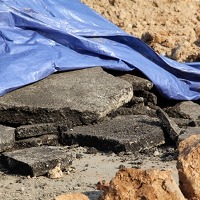외신도 월계동 아스팔트 방사능 문제를 보도했습니다. 후쿠시마 사고 이후 방사능 오염에 대해 촉각을 곤두세우고 있는 일본에서는, 11월 5일자 <아사히신문>이 '한국 도로에서 방사성 세슘 검출'이란 제목의 기사에서 이 문제를 다뤘습니다.
이 기사에는 "저는 이 길을 하루에 여러 번 이용한다"며 "주변 지역 도로까지 철저히 조사해야 한다"는 한 주민의 말을 전했습니다.
그리고 '주민들에 대한 건강조사를 실시해야 한다'는 환경단체의 주장을 인용하기도 했습니다. 아래는 기사 원문.
Radioactive cesium found on S. Korean streets
http://ajw.asahi.com/article/asia/korean_peninsula/AJ2011110516649
이 기사에는 "저는 이 길을 하루에 여러 번 이용한다"며 "주변 지역 도로까지 철저히 조사해야 한다"는 한 주민의 말을 전했습니다.
그리고 '주민들에 대한 건강조사를 실시해야 한다'는 환경단체의 주장을 인용하기도 했습니다. 아래는 기사 원문.
Radioactive cesium found on S. Korean streets
http://ajw.asahi.com/article/asia/korean_peninsula/AJ2011110516649
SEOUL -- South Korean authorities began digging up streets in Seoul’s Nowon Ward on Nov. 4, after high radiation levels were detected on the asphalt.
Employees of the government-affiliated Korea Institute of Nuclear Safety on Nov. 4 dug holes to collect samples of the road surface at intervals of about 5 meters along a 200-meter stretch of a shopping street in the Weolgye-dong district.
Radiation levels of 2.7 microsieverts per hour on the road surface and 1.8 microsieverts per hour at a height of 1 meter above the ground were measured near the front gate of the Induk industrial high school, which is on the road.
Officials said it was likely that the radiation source was cesium-137, which has a half-life of 30 years. It is suspected that the aggregate used to make the asphalt may have been contaminated with the radioactive material.
"I use this street many times a day. It's a part of life," said a female customer at a beauty salon facing the street. "I want a thorough investigation of all the surrounding areas."
Asphalt was also being removed on Nov. 4 at another road in a residential area about 1 kilometer from the shopping street. At the second location, radiation of 3.2 microsieverts per hour on the road surface and 1.4 microsieverts per hour at 1 meter above ground level was measured on Nov. 2.
That contamination was also attributed to cesium-137. Ward officials said road surface improvements had been carried out at both sites around 2000.
The scares in Seoul have drawn attention to the discovery of cesium-137 along a street in Gyeongju, in the southeast of the country, in February this year. The Gyeongju city government plans to remove asphalt there by the end of this year.
Lee Ji-eon, a member of the Seoul Federation for Environmental Movements, said local residents should be given health checkups.
By AKIRA NAKANO / Correspondent
관련글
2011/11/03 - 아스팔트 방사능 오염, 주민들 장기간 피폭… 건강역학 조사 시급
관련글
2011/11/03 - 아스팔트 방사능 오염, 주민들 장기간 피폭… 건강역학 조사 시급




